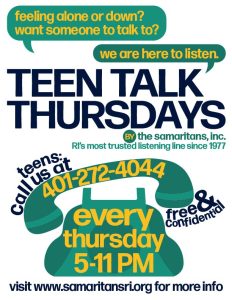The Important Role of Educators
When young people call our Crisis Hotline/Listening Line, we not only “listen” but try to help callers identify the trusted person they can talk to. When a family member is not available, we try to encourage callers to find school based support.
Teachers, counselors, nurses, coaches and other school staff can play a vital role in suicide prevention by becoming the TRUSTED PERSON a teen or young adult turns to when problems at home, school, work or in a relationship become overwhelming. A trusted person takes the time to “befriend” someone who is hopeless by listening without judgment or interruption, by taking all problems seriously (no matter how big or small they might appear) and by not offering advice too quickly.
Currently, the most effective suicide prevention programs equip educators with the tools to recognize who is at risk for suicide along with clearly stated, school based protocols.
We encourage you to explore our Educator pages to find links to information, resources and lesson plans tied to and consistent with RI teaching standards.
Assign our Suicide Prevention Website Quiz!
An assignment to help assess your student's understanding of suicide prevention information.
Important How-to info
Educators' Toolkit
Educator Resources
Know the signs
- Talking about, writing about, hinting at or threatening suicide (such threats precede four out of five deaths by suicide)
- Alcohol or drug abuse
- Drastic changes in personality (for example, a person might become rebellious or reckless)
- Losing interest in favorite activities
- Sleeping too much or too little
- No appetite or overeating
- Previous suicide attempts
- Giving away prized possessions
- Fatigue, lethargy or apathy
- Doing poorly in school
- Social withdrawal or isolation
- Drastic changes in appearance
- Feelings of hopelessness or helplessness
- Conflicts with friends and family
